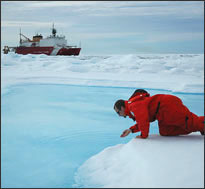
The general public continues to perceive a large degree of uncertainty among scientists on issues relating to climate change. A May 2011 survey sponsored by Yale University and George Mason University, for instance, showed that only 39% of the public believes that most scientists agree on global warming (up from 34% in 2010.)
A 2011 paper from George Mason University published in the International Journal of Public Opinion Research, “The Structure of Scientific Opinion on Climate Change,” collected the opinions of scientists in the earth, space, atmospheric, oceanic or hydrological sciences. The 489 survey respondents — representing nearly half of all those eligible according to the survey’s specific standards — work in academia, government or industry, and are members of prominent professional organizations.
The study’s key findings include:
- 97% of the 489 scientists surveyed agreed that that global temperatures have risen over the past century. Moreover, 84% agreed that “human-induced greenhouse warming” is now occurring.” Only 5% disagreed with the idea that human activity is a significant cause of global warming.
- “There was greater debate over the likelihood of substantial warming in the near future, with 56% seeing at least a 50-50 chance that temperatures will rise” 2 degrees Celsius over the next 50 to 100 years.
- “When [survey participants were] asked to rate the effects on a ten-point scale from trivial (1) to catastrophic (10), the mean response was 6.6, with 41% seeing great danger (ratings of 8-10), 44% moderate danger (4-7), and 13% little danger.”
- Though the expectation might be that scientists involved in industry would be more likely to have doubts about the validity of climate change, a statistical breakdown of the survey results showed that there was “no independent effect of industry employment on scientific attitudes toward climate change.”
- However, “scientists in academia were more likely than those in government or business to believe that global temperatures are likely to rise substantially in the future, and that the consequences will be particularly severe.”
The researchers conclude that the findings “provide little support for criticisms that scientists’ views on global warming are based on workplace pressures or desires to further their own careers or expand their public influence. We found disagreement over the future effects of climate change, but not over the existence of anthropogenic global warming. Indeed, it is possible that the growing public perception of scientific disagreement over the existence of anthropocentric warming, which was stimulated by press accounts of ‘Climategate‘ [the 2009 hacked emails controversy] is actually a misperception of the normal range of disagreements that may persist within a broad scientific consensus.”
In related research, a 2010 paper in the Proceedings of the National Academy of Sciences also found that among a pool of roughly 1,000 researchers who work directly on climate issues and publish the most frequently on the subject, 97% agree that anthropogenic climate change is happening.
Tags: science, greenhouse gases, global warming, campaign issue, climate politics
